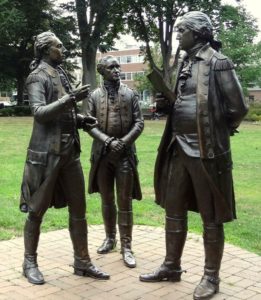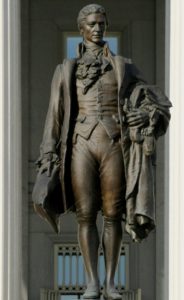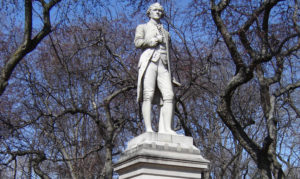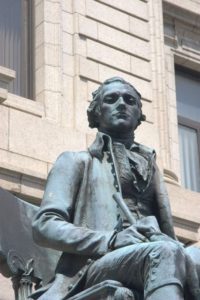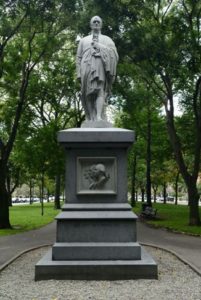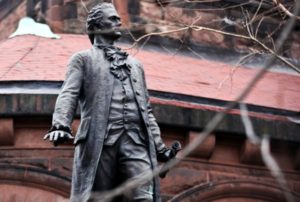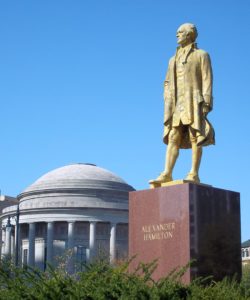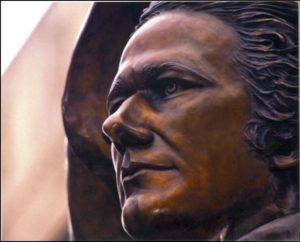 It’s a good time to be Alexander Hamilton. The Broadway musical that bears his name was nominated last week for 16 Tony awards, this after winning a Pulitzer Prize for drama. The US Treasury department announced last month that Hamilton will remain on the ten-dollar bill. Andrew Jackson didn’t fare so well, being displaced by Harriet Tubman. Whether he deserved that fate or not is a topic for another day. Hamilton apparently survived the cut not because of his extraordinary contributions to the establishment of this republic—and they were extraordinary—but because of the enormous popularity of the musical. One wonders—at least this one does—how it could possibly have come to that. Yet here we are.
It’s a good time to be Alexander Hamilton. The Broadway musical that bears his name was nominated last week for 16 Tony awards, this after winning a Pulitzer Prize for drama. The US Treasury department announced last month that Hamilton will remain on the ten-dollar bill. Andrew Jackson didn’t fare so well, being displaced by Harriet Tubman. Whether he deserved that fate or not is a topic for another day. Hamilton apparently survived the cut not because of his extraordinary contributions to the establishment of this republic—and they were extraordinary—but because of the enormous popularity of the musical. One wonders—at least this one does—how it could possibly have come to that. Yet here we are.
Why did it take his name in lights on Broadway and rendering his story through hip-hop for Americans to finally take stock of Alexander Hamilton? No other Founder has been treated with less national respect than Hamilton even as treating the Founders with disrespect has become de rigeour. How about this? Forget about taking him off the ten dollar bill—he  should be on every single denomination of currency, starting with the penny and moving up from there. We wouldn’t have a currency without him, nor perhaps a country to go with it.
should be on every single denomination of currency, starting with the penny and moving up from there. We wouldn’t have a currency without him, nor perhaps a country to go with it.
The musical is based upon Ron Chernow’s justly lauded 2004 book, Alexander Hamilton, the most recent—and most successful—attempt to re-position Hamilton in the national pantheon, building upon the work of previous Hamiltonian scholars: Broadus Mitchell’s two-volume Alexander Hamilton: Youth to Maturity, 1755-1788 (1957) and Alexander Hamilton: The National Adventure, 1788-1804 (1962); John C. Miller’s Alexander Hamilton: Portrait in Paradox (1959); Forrest McDonald’s quirky Alexander Hamilton: A Biography (1979); Robert Hendrickson’s quirkier The Rise and Fall of Alexander Hamilton (1981, based upon his 1976 two-volume work, Hamilton I: 1757-1789 and Hamilton II: 1789-1804); and Stephen Knott’s excellent summary of Hamilton’s ever-changing place in American culture, Alexander Hamilton and the Persistence of Myth (2002).
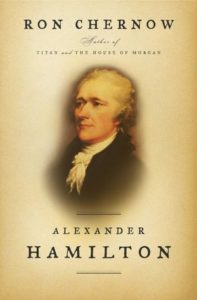 Chernow’s is a rather glowing portrait that I read recently (and largely agree with) but it is certainly not uncritical. He takes Hamilton to task for all manner of things, from his bad judgment in attacking John Adams in print just before the 1800 election to his horrendously bad judgment in carrying on an adulterous affair with Maria Reynolds and then confessing to it in print. No saint, this guy.
Chernow’s is a rather glowing portrait that I read recently (and largely agree with) but it is certainly not uncritical. He takes Hamilton to task for all manner of things, from his bad judgment in attacking John Adams in print just before the 1800 election to his horrendously bad judgment in carrying on an adulterous affair with Maria Reynolds and then confessing to it in print. No saint, this guy.
And yet, even if he’s only half the abolitionist or financial genius that Chernow says he was, as some recent critics have charged, he was still light years ahead of nearly every other one of the Founders on slavery and finance, and that’s saying something.
Why does Hamilton remain one of the most controversial figures in American history? Why has it been so hard to give him his due, and why among the Founders do we seem so reluctant to acknowledge his contributions and, yes, even to celebrate him?
Mainly because of that other guy. You know who I’m talking about. One is forbidden to talk about Hamilton without juxtaposing him with Thomas Jefferson. They are the Abbott & Costello of American history, inextricably linked in an eternal manologue about “Who’s On First” as it relates to the political culture of this country—large government vs. small, strong central government vs. states’ rights. Hamilton is always framed as Jefferson’s foil, as someone whose ideas had to be defeated so that Jeffersonian Democracy could reign supreme. I’ve written elsewhere about these two and their rivalry and how it still informs modern America.
From his own day to this, Hamilton has been accused of being elitist, a monarchist, out of step with America, hot headed, a plutocrat who cared nothing about ordinary people, enslaved to the monied classes and Wall Street. His speech at the 1787 Constitutional Convention in which he spoke favorably of a president for life is trotted out every so often to prove the point. It seems pretty clear to me, though Hamilton never expressly said so, that he gave faux support to an extreme view simply to make James Madison’s controversial Virginia plan look moderate by comparison (just as some believed that Donald Trump made Ted Cruz look reasonable). If Hamilton was a monarchist, why in the world would he have written 51 of the 85 Federalist Papers in a white heat in support of ratification? That most of these accusations about his supposed elitism came from slaveowners—and their subsequent supporters—who were somehow deemed more democratic than he should not surprise us. Hamilton’s story, like most, is far more complicated than that.
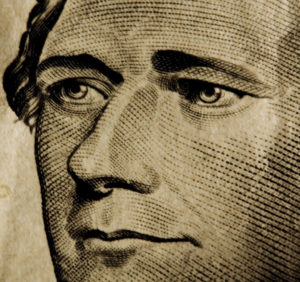 Until recently, most Americans were wholly ignorant of Hamilton and his contributions to American history, other than some vague and passing recognition of his image on the ten dollar bill. Even that was in jeopardy till Lin-Manuel Miranda made him a star. There is no Alexander Hamilton Memorial in Washington DC, and his home and grave in New York City suffered decades of neglect, though attendance at both are on the uptick, thanks again to the Broadway show.
Until recently, most Americans were wholly ignorant of Hamilton and his contributions to American history, other than some vague and passing recognition of his image on the ten dollar bill. Even that was in jeopardy till Lin-Manuel Miranda made him a star. There is no Alexander Hamilton Memorial in Washington DC, and his home and grave in New York City suffered decades of neglect, though attendance at both are on the uptick, thanks again to the Broadway show.
Despite Hamilton’s small stature, when you try to come to grips with him there’s a lot to get your arms around. Jefferson is almost always introduced by his long list of accomplishments, and they are many. But Jefferson came from money, status, and connections. His mother was a Randolph, and he was given every advantage that an oldest son of the Virginia gentry could be given. It would have been almost criminal if he hadn’t reached great heights.
Hamilton’s achievements are just as notable but were all attained without pre-existing advantages: born in poverty in the West Indies to an unmarried mother, he went on to become a student at what became Columbia University, a veteran of the Continental Army, captain of artillery, military aid to General Washington, battalion commander at Yorktown, New York legislator, member of Congress, attorney, member of the 1787 Constitutional Convention, signer of the Constitution, author of the majority of the Federalist Papers, first Secretary of the Treasury, founder of the American financial system that created the smoothly running machinery of a modern nation-state, founder of the bank of New York, and co-founder of the New York Evening Post newspaper. His time in the Continental Army–including starving and freezing at Valley Forge due in part to a weak national government–informed and shaped his nationalist thinking for the rest of his life. Jefferson wasn’t there.
Like Jefferson, he was a renaissance man as well: poet, essayist, abolitionist, educator, renowned orator, foreign policy expert, major general in the Army, voracious reader and writer. His writing achievements are staggering both in scope and volume. Though he died at 49, his collected writings and papers cover 32 thick published volumes running to 22,000 pages. His ability to turn out massive and articulate pamphlets and essays on incredibly difficult and complicated legal and financial subjects was nothing less than legendary. Hamilton never took any intellectual fortress by siege when he could attack it and overwhelm it head on. It was for good reason that his arch-rival Jefferson referred to Hamilton as a “host unto himself,” a one-man army. At the height of his powers no one could touch him, and the Sage of Monticello didn’t even try.
Another notable Hamilton difference from Jefferson: As I mentioned, Hamilton was born and grew up in the West Indies, where he witnessed slavery in all its brutality and cruelty first hand. In doing so he was no different than most of the other Founders. Unlike Jefferson, however, Hamilton loathed what he saw and became a pronounced opponent of slavery in a way that Jefferson never did. And yet it was Hamilton who was called elitist, not Jefferson. It was Jefferson who was called the champion of the common man, though he himself was never remotely common, while Hamilton raised himself up from poverty and never owned slaves.
It’s also worth noting that until Jefferson arrived in New York to become Secretary of State in March 1790, Hamilton filled that role as well. He easily became the Washington administration’s first and most influential foreign policy voice. It’s my belief that Hamilton could have filled all four of Washington’s cabinet positions—treasury, state, war department, attorney general—by himself. And served on the Supreme Court. None of the other cabinet officers could have done the same with nearly the expertise that he could. Remember too that he became Secretary of the Treasury at age 34. Imagine that happening now.
Jefferson from the first acknowledged and respected Hamilton’s enormous intellectual gifts. He called the Federalist Papers “the best commentary on the principles of government which was ever written.” As the workings of Hamilton’s financial system became better known, Jefferson’s unhappiness with it grew (though he never really understood it), and he and James Madison (Hamilton’s one-time ally) openly opposed it.
Jefferson, unlike Hamilton, hated open conflict, and he let Madison do most of the heavy lifting when it came to taking up the pen of opposition in the newspapers. But nobody could match Hamilton when it came to words, and it was here that Jefferson acknowledged Hamilton’s superior skills as a one-man army, an intellectual battering ram that no one could deflect. Eventually they both carped and complained loudly to President Washington, who grew weary of the open warfare in his cabinet.
But Jefferson has never had to rely on a Broadway musical to keep his brand front and center in American culture. He commands our attention because of the soaring language of the Declaration of Independence and its appeal to the universal rights of man. It calls to us in a way that Hamilton’s political and economic treatises never will. Hamilton’s passages in the Federalist might still be quoted in Supreme Court decisions, but they don’t touch our patriotic and romantic heartstrings the way Jefferson’s Olympian pronouncements do.
It’s the nature of his achievements that has made it difficult for Hamilton to climb up on Mount Rushmore. It’s like celebrating your accountant—the work they do is invaluable yet easily overlooked. They’re hardly ever invited to the party. Yet nobody gets paid without them.
There’s also no getting around the fact that Hamilton was undoubtedly something of an arrogant jerk when he wanted to be. He married up—Elizabeth Schuyler of the politically powerful New York clan—and then broke the cardinal rule by forgetting that he did, dragging his wife and ultimately his reputation through the mire of his adulterous affair with Maria Reynolds. The manner in which he left Washington’s staff during the war, his inability to overlook even mild criticism, his touchy ego that was sensitive to slights, his defensiveness and combativeness that almost no other Founder had—all of it can be traced to his ongoing insecurity based on his shaky West Indian origins, most of which has only been discovered over the last century. Among his contemporaries—Adams, Washington, Jefferson, Madison—none of them knew all the circumstances of his humble birth and never understood how far he had risen.
Hamilton’s achievements as the first Secretary of Treasury don’t sound like the stuff of legend today, but to an infant country trying to stave off financial bankruptcy and take its place among the great powers of the world, they were staggering. He seized the initiative in a way that startled everyone, and not surprisingly his enemies grew as fast as his reputation for genius.
Chernow says that Hamilton is the closest America has ever come to a prime minister, and it’s hard to argue with him. As America’s first president, Washington stayed above the political fray, believing himself head of state; Hamilton eagerly filled the void and became head of government. In a little over five combatively controversial years, he created from scratch the framework of the economic colossus that would one day bestride the world: a budget system, a funded debt, a tax system, a central bank, a customs service, and a coast guard.
Everything he proposed raised constitutional issues, some of which we’re still grappling with. The new Constitution wasn’t clear about a lot of things, and Hamilton seized the moment, insisting that the Constitution had the flexibility to meet the new nation’s needs, to create a national system necessary for economic growth. Having helped write and ratify the Constitution, he zeroed in on three of the document’s more nebulous clauses: the necessary and proper clause, the general welfare clause, and the commerce clause.
Of Hamilton’s great “reports” that he wrote during his tenure—among them the Report on Public Credit (40,000 words written in three months, complete with mathematical equations) and the far-seeing Report on Manufactures—none carried more weight for the future United States than his “Opinion on the Constitutionality of the Bank.” Get past the wonky title for a moment. Almost everything the United States government has done, from that day to this, that is not specifically spelled out in the Constitution but that speaks to a strong central government that can meet the needs of a vast and powerful people—from the Federal Reserve to the New Deal, from making sure that human body parts are not in the food you eat, to screening terrorists at the airport, from Medicare to Social Security–derives from the implied powers of Hamilton’s interpretation of the Constitution. Thank him or hate him for it as you please.
None of Hamilton’s proposals raised more raised tangled constitutional questions than the proposed Bank of the United States, which would solidify the relationship between the national government and the business classes. Banks and the financial foundation upon which they function are such an established part of our daily lives that we forget how controversial they once were—though one need look no farther than Bernie Sanders’ campaign rhetoric and the financial meltdown of 2008 to help us remember.
Hamilton thought a national bank essential for the fledgling nation’s long-term health. The proposed Bank of the United States’ charter breezed through the Senate but met stiff opposition in the House, led by Madison, by then a full-throated ally of Jefferson and adversary of Hamilton’s. Was the bank constitutional? Madison, a strict constructionist who certainly knew a thing or two about the Constitution, said it was not, though he couldn’t prevent its passage in the House. The bill landed on President Washington’s desk, and opponents howled for a veto.
Washington found himself on unsteady ground and polled his cabinet on the bill’s constitutionality: Attorney General Edmund Randolph voted against. Jefferson of course opposed it as a monopoly and a charter similar to those granted by kings. As for necessary and proper, Jefferson said that Hamilton was mis-using the clause; a measure had to be really necessary, not just convenient; it needed to be indispensable. Washington then sent Randolph and Jefferson’s objections to Hamilton and asked for a reply.
The One-Man Army met this challenge as he met all who opposed him: head on. In just over a week he penned a response that came in at 15,000 words, nearly 40 printed pages. It was a manifesto that would echo and re-echo through the Supreme Court opinions of Chief Justice John Marshall, down to the present day.
Hamilton said that the Constitution gave the government the means to attain the ends necessary to govern, otherwise government and ultimately society would dissolve. There were, he said, implied powers in addition to those enumerated in the Constitution, and that government had the right to employ all means necessary to carry out powers that were actually mentioned in the Constitution. The Bank, he said, was necessary and proper to the well being of the financial stability of the United States. To take Jefferson’s view would paralyze the government (remember here who had served and starved at Valley Forge and who had not), rendering the very idea of a national government a joke, much as it had been under the Articles of Confederation. The Bank, Hamilton said, would make it possible for the United States to do four things explicitly mentioned by the Constitution: collect taxes, borrow money, regulate trade among states, and support an army and navy. To do otherwise would cripple American business—and with it the American nation. Washington, staggered under the weight of Hamilton’s verbiage, spent a whole day pouring over the report, and signed the bank bill into law the next day in February 1791.
A century later Henry Cabot Lodge called Hamilton’s doctrine of implied powers “the most formidable weapon in the armory of the Constitution, capable of conferring on the federal government powers of almost any extent”—words that to this day can strike fear or hope into the hearts of every American, depending on their political persuasion. Hamilton’s language found its way into John Marshall’s decision in McCulloch v. Maryland almost 30 years later, a decision that decidedly cemented the nationalistic powers of the federal government and that infuriated Jeffersonian states righters. Historian Clinton Rossiter went even further: “Hamilton’s works and words have been more consequential than those of any other American in shaping the Constitution under which we live.”
And yet. Despite his clear influence and achievements, Hamilton has somehow remained outside the mainstream of the America in which he lived and that he helped create. If the Reynolds affair didn’t kill his political career, then his party infighting with President John Adams during his administration did. His pamphlet attacking Adams on the eve of the election of 1800 (see below) sealed Adams defeat and ushered in the Jeffersonian Republicans—either Burr or Jefferson, the results at first weren’t clear—and ended his influence with the Federalist party. He spent the rest of his short life in New York legal circles feeling much like a man without a country—and has remained so in death. Political differences with Aaron Burr would lead him to that fateful meeting in Weehawken in 1804, another astoundingly bad decision by a man with a wife and 7 children depending on him. Burr’s bullet lodged in Hamilton’s spine, paralyzing him. With today’s medical care, he might have survived as a paraplegic, but he died in great agony on July 12, 1804, at the age of 49.
Strangely enough, Hamilton’s name is now being invoked by some Republicans in the context of the current presidential campaign as an example of leadership and political bravery rather than folly. Hamilton opposed John Adams’ re-election in the contest of 1800 because, Hamilton said, Adams wasn’t a true Federalist: “If we must have an enemy at the head of Government, let it be one whom we can oppose, and for whom we are not responsible, who will not involve our party in the disgrace of his foolish and bad measures.” Sound familiar?
It gets better. After Adams’ defeat, and forced to choose between his old nemesis Jefferson and hated New York political rival Aaron Burr, Hamilton didn’t hesitate. He supported Jefferson as the lesser of two evils and encouraged other Federalists to do so as well. Jefferson might have different political opinions, he said, but at least he was an honest man with principles. Hamilton dismissed Burr as an ambitious, corrupt, immoral would-be tyrant who cared only for himself. Jefferson might or might not be a bad president, but Hamilton thought Burr would destroy the republic: “Mr. Jefferson, though too revolutionary in his notions, is yet a lover of liberty and will be desirous of something like orderly government. Mr. Burr loves nothing but himself – thinks of nothing but his own aggrandizement – and will be content with nothing short of permanent power in his own hands.” Some Republicans are channeling the ghost of Hamilton this year.
Did Hamilton unleash unbridled capitalism or ordered liberty? That debate will never be settled. The verdict at the moment is that Hamilton saved the fledgling United States from bankruptcy and laid the groundwork for a capitalist and a democratic revolution to grow side by side. That’s not a bad day’s work and it’s way past time that we acknowledged it. It seems silly at this late date that we are still compelled, as Andy Griffith once put it about football, to “commence to odd man” over Hamilton and Jefferson. It’s no small thing that Jefferson would call upon the doctrine of implied powers in defending the Louisiana Purchase less than 10 years later. There certainly was nothing in the Constitution that would have allowed the federal government to purchase three million acres from a foreign power. It’s also hard to imagine the Marshall court’s nationalist decisions that paved the way for the United States government to become the prime engine of emancipation, the Civil Rights movement, and America’s participation on the global world stage in the last and present centuries without the vision and leadership of Alexander Hamilton.
As the 2016 presidential contest begins in earnest, it’s clear that Hamilton’s interpretation of the United States Constitution—which he helped write and ratify and then breathed life into—is still at the heart of nearly everything we do and most of what we argue about. The doctrine of implied powers remains at the heart of our constitutional system, as controversial now as it was then. His ideas are as relevant and as contentious today as they were two centuries ago. This West Indian immigrant and his achievements, his failures, his vision, remains a vibrant part of the American landscape, whether we acknowledge him or not.
Perhaps I was wrong. Instead of lamenting that there’s no Hamilton memorial in Washington, consider this instead: The Hamilton musical is netting a profit of $1.5 million a week. That’s a lot of money changing hands in secure and safe transactions, all backed up by the United States Treasury. Maybe we’ve acknowledged him in the best way possible in the country that wouldn’t exist without him.
Hamilton famously said near the end of his life that this American world was not made for him. He got that backwards: he was made for this American world. Alexander Hamilton is still a Host Unto Himself.



